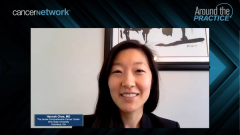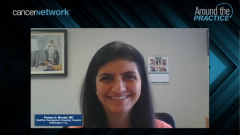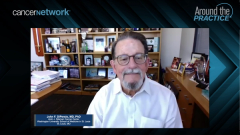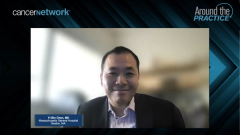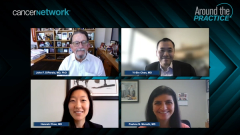
Impact of GVHD on Leukemic Relapse and Patient Outcomes
Hannah Choe, MD, guides the panel in a conversation on the protective effects of acute and chronic GVHD including the potential impact on leukemic relapse.
Episodes in this series

John F. DiPersio, MD, PhD: Hannah, I want to know that the reason we put people through transplant is because we want to prevent leukemia from coming back. What’s your sense of the protective effects of acute and chronic graft-vs-host disease [GVHD]? Are they the same? Are they different? What do you think?
Hannah Choe, MD: It’s a fortunate and unfortunate thing at the same time. The alloreactivity that causes graft-vs-host disease, for both acute and chronic, is also the alloreactivity that we get the benefit from for graft-vs-leukemia. There’s always this thinking that we won’t mind a little graft-vs-host disease as long as it’s controllable, as long as it’s responsive to therapy. But anything beyond that, we don’t want it because that’s going to contribute to nonrelapse mortality. That’s going to affect survival and quality of life. There’s no way we have that separates the 2. But in the future, that’s where we head: to differentiate how to treat graft-vs-host disease without compromising the risk of relapse.
John F. DiPersio, MD, PhD: It’s interesting, if you take the T cells out of a transplant, you’re going to have lots of problems, like graft failure, infections, and increased relapse. If you look at the incidence of leukemic recurrence in patients that have little or no GVHD compared with patients who have significant GVHD, the risk of relapse is similar. Meaning that that beneficial effect can be seen as long as some T cells present are operative. You don’t have to get severe GVHD to get your maximum antileukemic effect. It’s better to have T cells and them as opposed to taking them out completely. That’s No. 1. No. 2, if you have GVHD, it’s better to have less than more for quality-of-life and survival purposes because you get about the same antileukemic effect.
What about the issue of antileukemic effects in the context of chronic GVHD vs acute GVHD? Hannah, what do you think?
Hannah Choe, MD: In long-term studies, we see that patients who have chronic GVHD have very low likelihood of relapse. But the survival outcomes sometimes, in severe cases of chronic GVHD, are mitigated by that benefit with chronic GVHD for relapse. Certainly, there’s a much-reduced risk of relapse in the chronic GVHD setting as well.
Transcript edited for clarity.
Newsletter
Stay up to date on recent advances in the multidisciplinary approach to cancer.


